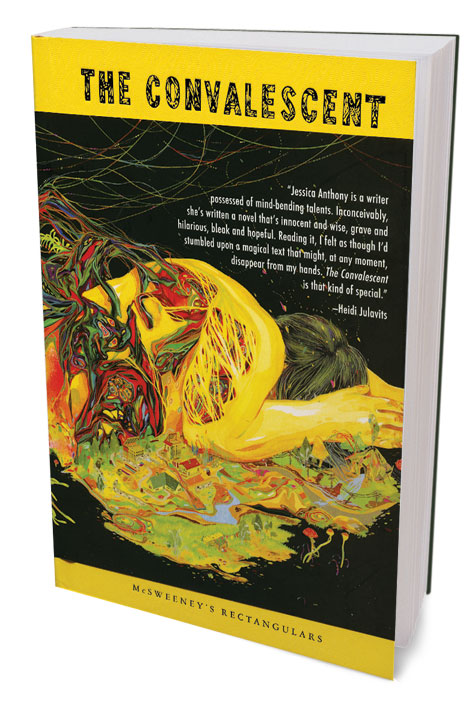
HEAVY INTO METAPHORS Jessica Anthony's The Convalescent |
There are probably 10 or 15 reviews I could write of Jessica Anthony's The Convalescent. Leitmotifs populate the book's 240 pages like thick, black hairs on the back of an old man's wrinkled ass.
What? That particularly off-putting simile? It's what Portlander and USM prof Anthony pounds you with from page one: the grotesque, odd, ill-seeming, and foul. Everything that is other — as personified in Rovar Pfliegman, the book's first-person narrator and ultimate loner.
Perhaps the best indication of Anthony's talents is that you can become Rovar and not be repulsed by yourself. Despite his every attempt to make you run from him screaming, you can't possibly stop hearing his voice. It's a book you can crush in one sitting that doesn't really even have a plot. A book you could read backwards, starting with the last chapter and finishing with the first, and enjoy almost as much.
As Pfliegman's oral history of the Pfliegmans (a German-named tribe of Hungarians) unfolds, stretching from the generation before him back as far as 1000 years, we bear witness to the most downtrodden of people — "the weakest among you" — and see proof that perhaps the meek shall inherit the Earth.
At its core, TheConvalescent is a creation myth, an exploration of where history, religion, memory, and invention overlap in the Venn diagram of the past. How do we look on the past? Do we see the heroes and conquerors as driving history forward, or, as Rovar postulates, "Isn't it for the protection of the weakest members of our race that all good change happens in the world?" Hasn't society moved itself forward primarily to eliminate poverty, hunger, disease, and pestilence, those things that feast on the weakest among us? What, then, is at the core of progress? Is it true that those things we label as most vile and distasteful are in fact the most vital and impactful?
The Pfliegmans are the species humanity evolves past.
Maybe the most cliché of creation myths is that of the butterfly that flapped its wings in Africa (or wherever) and created a hurricane (maybe a typhoon). Anthony rides this metaphor hard, the meekest creating the most powerful and beautiful, like Ken Kesey's turtle. Like the twin wolf-son Romulus who offs his brother Remus to become king of Rome (there's actually a minor wolf meme here, but it's kind of undeveloped). Like the son who joins his father by dying for the sins of humanity (a stigmata one, too, and sacrifice).

Jessica Anthony |
Sometimes the metaphors are extremely heavy-handed. I think we got that he was Ellison's Invisible Man. (Does "I live rent-free in a building rented strictly to whites, in a section of the basement that was shut off and forgotten during the nineteenth century" sound like a midget Hungarian living in the heart of white-bread Virginia, populating a bus that doesn't run, in a field about to be turned into a subdivision, selling stolen meat at discount prices?) We didn't need him physically wrapped in bandages to trumpet that other invisible man. We didn't need the word "Imago" defined, on its own transitional page, to complete the butterfly analogy.
But the bludgeoning is part of the point. Anthony loves being over the top. One of Rovar's ancestors quite literally births the Danube; its source is her amniotic fluid. What do the Pfliegmans do at their leisure? "[W]e were lazing about on our backs, smelling our skins, chewing our toenails for breakfast. Peeling fleas from our long strands of hair." There are parts of the book I read with my shirt over my nose to guard against the vividly depicted stench.
Anthony is a strikingly good sentence-level writer, highly literary and even very funny (expert swearing in historical dialogue, especially). What will you make of the Kafka-esque finish? That's going to be a personal thing. Kind of like whether you're a meat eater or not.
Sam Pfeifle can be reached at sam_pfeifle@yahoo.com.
JESSICA ANTHONY |reads from The Convalescent | McSweeney's | 240 pages | $22 | at Longfellow Books, in Portland | Sept 3 | www.twitter.com/jessicaanthony